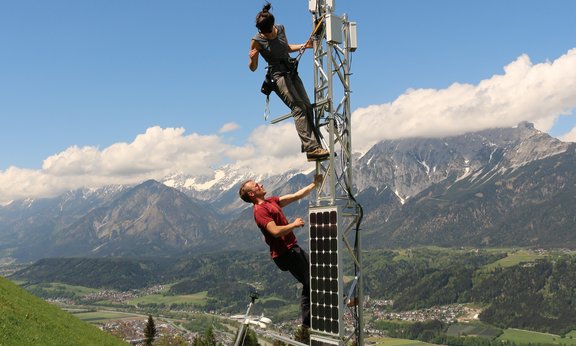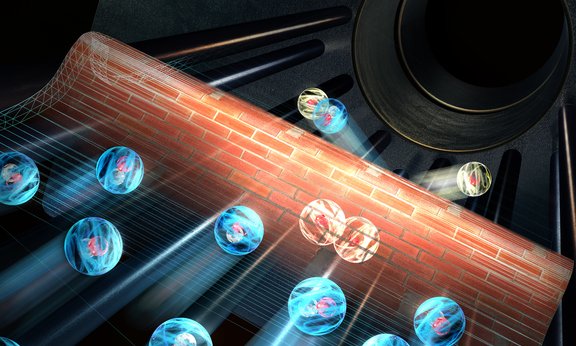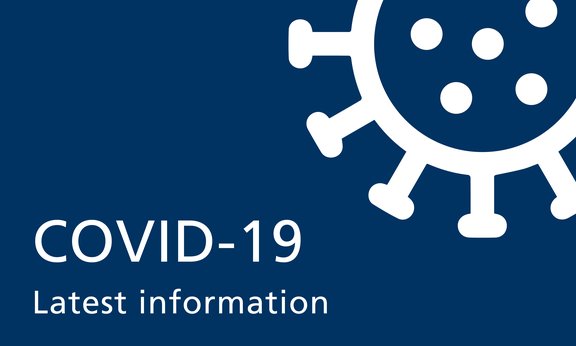
Quantum simulator project enters second round
PASQuanS2 aims to develop next-generation programmable, large-scale atomic quantum simulators operating with up to 10,000 atoms building on the successful European Quantum Flagship project PASQuanS and unites 25 academic and technology partners from Austria, France, Germany, Italy, Slovenia and Spain, among them the University of Innsbruck, IQOQI and the Spin-offs AQT und ParityQC.

Two qudits fully entangled
Recently quantum computers started to work with more than just the zeros and ones we know from classical computers. Now a team at the University of Innsbruck, Austria, demonstrates a way to efficiently create entanglement of such high-dimensional systems to enable more powerful calculations.

EU Flagship project Millenion launched
The Millenion project focuses on modular scalability and accessibility aspects of trapped-ion quantum computers, tackling the transition from current laboratory-based experiments to industry-grade quantum computing technologies. 14 academic and industrial leaders across Europe are joining forces to deliver a modular and scalable quantum computing suite with high performance cluster integration and a fault-tolerant register of up to 1000 qubits.

Quantum liquid becomes solid when heated
Solids can be melted by heating, but in the quantum world it can also be the other way around: In a joint effort, an experimental team led by Francesca Ferlaino in Innsbruck, Austria, and a theoretical team led by Thomas Pohl in Aarhus, Denmark, show in Nature Communications how a quantum liquid forms supersolid structures by heating. The scientists obtained a first phase diagram for a supersolid at finite temperature.

Best Paper Award for Adam Jatowt
Computer scientist Adam Jatowt was awarded the Best Paper Award at the European Conference on Information Retrieval (ECIR) this year in Dublin for the article "Temporal Natural Language Inference: Evidence-Based Evaluation of Temporal Text Validity".

Stowaways in the Genome
At the University of Innsbruck, scientists have discovered over 30,000 viruses by using the high-performance computer cluster “Leo” and sophisticated detective work. The viruses hide in the DNA of unicellular organisms. In some cases, up to 10% of microbial DNA consists of built-in viruses.

Collaboratively exploring vital calcium channels
Innsbruck is an internationally renowned center for voltage gated calcium channel research. A new generation of scientists at the University of Innsbruck and the Medical University Innsbruck continues this successful path. Based on the FWF-funded doctoral program CavX, the researchers are investigating together a wide range of calcium channel properties and functions in health and disease using the most state-of-the-art methods.

Turbulence: Decades-old theory gets a major remake
Turbulence plays an essential role in weather and climate, and correctly representing its effects in numerical models is crucial for accurate weather forecasts and climate projections. However, the theory describing the effect of turbulence has not changed since its conception in 1950s, despite the fact that it is not representative for the majority of the Earth’s land surface, especially over mountains and polar regions. The Innsbruck meteorologist Ivana Stiperski has now extended the turbulence theory to complex atmospheric conditions. The researcher thus paves the way for the first generalized turbulence theory over complex terrain.

Three Clusters of Excellence in Innsbruck
With highly endowed clusters of excellence, the Austrian Science Fund FWF creates Austrian flagships of basic research. The University of Innsbruck will coordinate the Cluster of Excellence for Quantum Sciences and is involved in two Clusters of Excellence on political, social and cultural developments in Eurasia and on materials for energy conversion and storage.

Two-dimensional quantum freeze
Researchers at ETH Zurich and TII Abu Dhabi, with the support of quantum optics theorists from Innsbruck, Austria, have succeeded in simultaneously cooling the motion of a tiny glass sphere in two dimensions to the quantum ground-state. This represents a crucial step towards a 3D ground-state cooling of a massive object and opens up new opportunities for the design of ultra-sensitive sensors.

Quantum Chemistry: Molecules caught tunneling
Physicists led by Roland Wester of the University of Innsbruck have now for the first time observed a quantum mechanical tunneling reaction in experiments. The observation can also be described exactly in theory. With the study published in Nature, the scientists provide an important reference for this fundamental effect in chemistry. It is the slowest reaction with charged particles ever observed.

High-performance computer with quantum coprocessor
With 9 million euros in funding from the NextGenerationEU recovery plan for Europe, the University of Innsbruck will combine a quantum computer with a supercomputer in the coming months. The novel system will be used in various fields such as computer science, physics, mathematics and beyond and will be open to all scientists in Austria for research and teaching.

Tracing the origin of life
A team of scientists from France and Austria has discovered a new abiotic pathway for the formation of peptide chains from amino acids - a key chemical step in the origin of life. The current study provides strong evidence that this crucial step for the emergence of life can indeed occur even in the very inhospitable conditions of space.

Detective work at sea: whale research via environmental DNA
Detailed knowledge about whales in European waters will be provided by the Biodiversa+ project "eWHALE", which started in January and is led by molecular ecologist Bettina Thalinger from the University of Innsbruck. The transnational research project brings together partners from science, industry and the public to establish a far-reaching, non-invasive cetacean and biodiversity monitoring system using water samples.

COVID-19: The current semester
Even though Corona will remain and we will all have to live with it in the long run, we are currently in a very good situation - from the point of view of society as a whole as well as within the university. Therefore, all currently valid regulations at the University of Innsbruck regarding COVID-19 will be lifted with immediate effect. The Rector's team is very concerned about the health of all university employees, which is why the situation around COVID-19 will be monitored in the future in order to be able to take necessary steps if necessary.

Entangled atoms across the Innsbruck quantum network
Trapped ions have previously only been entangled in one and the same laboratory. Now, teams led by Tracy Northup and Ben Lanyon from the University of Innsbruck have entangled two ions over a distance of 230 meters. The experiment shows that trapped ions are a promising platform for future quantum networks that span cities and eventually continents.

Rina Alluri is the new UNESCO Chairholder in Innsbruck
On 26 January, peace researcher Rina M. Alluri was inducted as the new UNESCO Chairholder for Peace Studies in Innsbruck. She succeeds Wolfgang Dietrich and is also co-director of the Master's programme "Peace and Conflict Studies".

A Quantum Video Reel
When it comes to creating ever more intriguing quantum systems, a constant need is finding new ways to observe them in a wide range of physical scenarios. JILA Fellow Cindy Regal and JILA and NIST Fellow Ana Maria Rey have teamed up with Oriol Romero-Isart from the University of Innsbruck and IQOQI to show that a trapped particle in the form of an atom readily reveals its full quantum state with quite simple ingredients, opening up opportunities for studies of the quantum state of ever larger particles.

Underlying assumptions of air quality need to be redefined
Long-term measurements in the urban area of Innsbruck, Austria, show that the fraction of ozone near the surface tends to be overestimated in atmospheric models. Consequently, a fundamental assumption for air quality forecasting has to be reinterpreted for urban areas. Measurements by an international team led by atmospheric scientist Thomas Karl of the University of Innsbruck also show that direct nitrogen dioxide emissions are overestimated.

Anton Zeilinger awarded honorary doctorate
Today, quantum physicist Anton Zeilinger was awarded an honorary doctorate in the Aula auditorium of the University of Innsbruck. The Nobel Prize winner of 2022 was honored for his outstanding scientific achievements. Zeilinger was a professor at the Department of Experimental Physics at the University of Innsbruck from 1990 to 1999, where he carried out much of the work recently honored with the Nobel Prize.

Blast Chiller for the Quantum World
The quantum nature of objects visible to the naked eye is currently a much-discussed research question. A team led by Innsbruck physicist Gerhard Kirchmair has now demonstrated a new method in the laboratory that could make the quantum properties of macroscopic objects more accessible than before. With the method, the researchers were able to increase the efficiency of an established cooling method by an order of a magnitude.

Quantum entanglement sharpens measurements
According to Heisenberg's uncertainty principle, two complementary properties, for example single components of a magnetic field, cannot be determined with arbitrary precision at the same time. An international team of scientists has now tested a new method on about a dozen quantum computers with which multiple parameters can be optimally determined simultaneously using entangled copies of a quantum state.

International experts introduce new master's degree in pharmacy
Since the winter semester 2022/23, the University of Innsbruck and the Medical University of Innsbruck offer the joint master's programme "Pharmaceutical Sciences". International experts from industry and regulatory authorities were guests at the kick-off.

Digital information platform for refugees
At the International Conference on Information Systems ICIS 2022 in Copenhagen, Maximilian Schreieck from the Department of Information Systems, Production Management and Logistics has been awarded the AIS Impact Award for his support of digital solutions for refugees.

Heat and cold as health hazards
Both hot and cold environments trigger a stress response in the human body and can lead to cardiovascular problems. Physiologist Justin Lawley from the Department of Sport Science and colleagues have recently investigated both factors in scientific studies. The results, which were published in the Journals Scientific Reports and Experimental Physiology, are especially interesting in light of the current multiple global crises.

Leveraging Ethics to Make Quantum Research Sustainable
Innsbruck is a leading center in the development of new quantum technologies. In order to understand the processes of societal change triggered by these technologies and to be able to develop corresponding ethics frameworks, the University of Innsbruck is founding today the Innsbruck Quantum Ethics Lab (IQEL), in which experts from various disciplines will work together.

Statistics: Brazil is the clear favourite going into the FIFA World Cup
After being eliminated in the quarter-finals four years ago, the Brazilian national team is once again the clear favourite to win the FIFA World Cup. But Argentina, the Netherlands, Germany and France also have a good chance of winning the title – as shown by an international team of researchers from the Universities of Innsbruck, Ghent and Luxembourg and the Technical Universities of Dortmund and Munich.

Method to characterize large quantum computers
Quantum devices are becoming ever more complex and powerful. Researchers at the University of Innsbruck, in collaboration with the Johannes Kepler University Linz and the University of Technology Sydney, are now presenting a method to characterize even large quantum computers using only a single measurement setting.

Ultra-cold mini twisters
A team of quantum physicists from Innsbruck, Austria, led by three-time ERC laureate Francesca Ferlaino has established a new method to observe vortices in dipolar quantum gases. These quantum vortices are considered a strong indication of superfluidity, the frictionless flow of a quantum gas, and have now been experimentally detected for the first time in dipolar gases.

New form of universal quantum computers
Computing power of quantum machines is currently still very low. Increasing it is still proving to be a major challenge. Physicists at the University of Innsbruck now present a new architecture for a universal quantum computer that overcomes such limitations and could be the basis of the next generation of quantum computers soon.

Meet the locals: Teatime in the Botanical Garden
Social events for international researchers and professionals are periodically organised by the Welcome Service Tyrol team of the Standortagentur (Business Location Agency). These very popular meetings, whether it is a small get-together or the big autumn event for the whole family with a guided tour at the Alpenzoo, offer a great opportunity to network with other internationals and newcomers to Tyrol in a pleasant atmosphere.

Build an advanced European quantum internet ecosystem
The Quantum Internet Alliance has started a seven-year program to build an innovative Quantum Internet ecosystem in Europe. The first phase has a budget of 24 million euros. The research groups led by Tracy Northup and Benjamin Lanyon at the Department of Experimental Physics of the University of Innsbruck and the quantum computer spin-off AQT will be involved in the project.